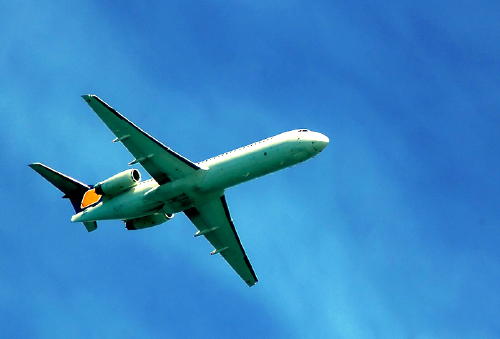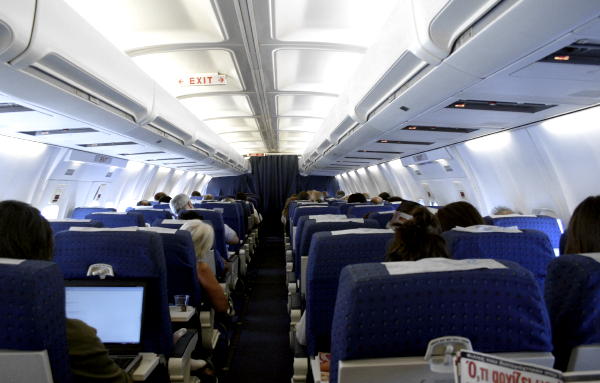Flying can be a nerve-wracking or unpleasant experience for many people for a variety of reasons – motion sickness, bland airplane food, crying babies, delays and uncomfortable seats are just a few of the inconveniences faced by travelers. But for those with a fear of flying, traveling can literally be a nightmare.
I suffer from a terrible fear of flying, yet my love of travel means that it’s a fear I have to face often. Through the years I’ve managed to learn to control my fear, for the most part. Here are a few tips to make a flight a little less traumatic.
Keep it in Perspective
 On an average day, nearly 25,000 planes take to the skies – nearly 10 million a year. Consider those numbers in relation to the number of incidents you hear about. Over the past 10 years, flight safety has dramatically increased; you are far more likely to be injured in a car crash than in a plane crash. If numbers alone don’t calm your fear, get a visual at Flight Aware, which tracks the progress of airborne aircraft, or arrive at the airport early to watch a few planes take off and land. I find that thinking about how many planes are in the air all the time, without incident, gives me more confidence that my plane will be fine too.
On an average day, nearly 25,000 planes take to the skies – nearly 10 million a year. Consider those numbers in relation to the number of incidents you hear about. Over the past 10 years, flight safety has dramatically increased; you are far more likely to be injured in a car crash than in a plane crash. If numbers alone don’t calm your fear, get a visual at Flight Aware, which tracks the progress of airborne aircraft, or arrive at the airport early to watch a few planes take off and land. I find that thinking about how many planes are in the air all the time, without incident, gives me more confidence that my plane will be fine too.
For those concerned about the competency of the pilot, just remember that he or she likely has a family too. The pilots do all they can to ensure a completely safe flight. They, and the flight attendants, would not fly almost daily if they felt it was dangerous.
Do Your Research
 Many people have a fear of flying because they don’t understand the mechanics of flight. How can something that weighs nearly 900,000 pounds manage to fly several hundred miles per hour 6 miles above ground? There are a lot of complex mechanics that go into it, but the basic principles involve lift and thrust. You can learn all about the science behind flight on the internet or in a book, or for total immersion, by taking a flight lesson. I recently took a lesson in a small four-seater Cessna. It was terrifying at first, but concentrating on the controls kept me calm and learning more about how planes work has helped ease my fears when flying commercially.
Many people have a fear of flying because they don’t understand the mechanics of flight. How can something that weighs nearly 900,000 pounds manage to fly several hundred miles per hour 6 miles above ground? There are a lot of complex mechanics that go into it, but the basic principles involve lift and thrust. You can learn all about the science behind flight on the internet or in a book, or for total immersion, by taking a flight lesson. I recently took a lesson in a small four-seater Cessna. It was terrifying at first, but concentrating on the controls kept me calm and learning more about how planes work has helped ease my fears when flying commercially.
Some people find it helpful to think of a plane as a boat floating on water. A boat wouldn’t sink for no reason, the same as a plane wouldn’t fall out of the sky at random. This boat image is particularly helpful when dealing with turbulence. Planes go through rigorous testing to make sure they can withstand even the most severe turbulence. It is highly unlikely that a plane will crash due to turbulence (actually the biggest worry about turbulence for flight attendants is that a passenger who isn’t buckled in may get injured). Most of the time during turbulence, though the plane may feel like it is bouncing all over the place, it is really only moving up and down a few feet. One way to gauge the severity of the turbulence is to put a half-full glass of water on your tray table and watch how much the water moves. Even though the turbulence might feel bad, you’ll be surprised to see the water barely sloshes.
Be Honest
Countless fearful flyers fly every day, though most keep their fears to themselves.
I always let the flight attendants and the people around me know that I am a little uneasy. I’ve found that most of the flight attendants will go out of their way to make sure I am comfortable and to keep me informed of any upcoming turbulence. Chatting with other passengers about my fears, and hearing about how many times they have flown safely, also helps to alleviate my fears.
Stay Busy
One of the best ways to calm your fear is to keep your mind on something else. On long flights, particularly overseas, this can be difficult. Be sure to bring plenty of books or magazines to keep you busy. Bring an iPod and headphones or watch the in-flight entertainment. On an overnight flight, try to get some sleep.
Seek Help
For a truly debilitating fear, sometimes the only option for controlling it is through medical intervention. Some people have found hypnosis to be effective while for others the only thing that helps is medication. My doctor has prescribed an anti-anxiety medication for me. I take it two hours before my flight and, combined with following the other advice listed above, it has greatly helped manage my fear. A more mild case of flight fear may be calmed with an online class, such as the one offered through Fear of Flying.
Air travel is safe. Just follow these tips for managing your fears and if all else fails, talk to a doctor. A fear of flying shouldn’t keep you from exploring the world.


Comments